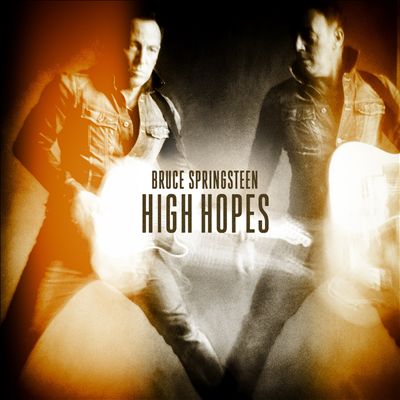
High Hopes (2014)

1. High Hopes
2. Harry's Place
3. American Skin (41 Shots)
4. Just Like Fire Would
5. Down in the Hole
6. Heaven's Wall
7. Frankie Fell In Love
8. This is Your Sword
9. Hunter of Invisible Game
10.The Ghost of Tom Joad
11.Wall
12.Dream Baby Dream
The appearance of High Hopes in Bruce Springsteen’s catalogue is curious—less a formal album in the traditional sense than a patchwork of ideas, outtakes, re-interpretations, and half-finished ambitions. Ostensibly intended to satisfy the long-clamouring demands of his dedicated fanbase for unreleased material, the end result feels oddly disconnected, as though the artist himself were uncertain whether to present it as a statement or a placeholder.
From the outset, coherence is noticeably absent. The title track, a cover of a lesser-known song by Tim Scott McConnell (of The Havalinas), sets the tone, not in the sense of establishing a musical blueprint, but in laying bare the sonic confusion that follows. Blaring brass, a strident march rhythm, and a repetitive chorus do little to capture the Springsteen sound, and even less to improve on the original.
Into this mélange enters Tom Morello—better known for his aggressive work with Rage Against the Machine—whose contributions are impossible to ignore. Springsteen, commendably unafraid to take risks even deep into his career, hands Morello the reins on several tracks, both instrumentally and vocally. The results are mixed. Where Springsteen tends to build a song from the inside out, grounding his anthems in narrative and emotional crescendo, Morello approaches the same material with all the subtlety of a belt sander. His guitar technique—often celebrated in his own context—proves intrusive here, and tracks like Harry’s Place and Heaven’s Wall suffer accordingly. If Morello is meant to inject energy, he instead overwhelms. One longs not for more of him, but less.
Still, Springsteen finds occasional footing. The studio debut of American Skin (41 Shots), long a staple of his live repertoire, is sensitively rendered, though it adds little to its original incarnation. The Ghost of Tom Joad, by contrast, benefits greatly from its reimagining. Electrified and recharged with Morello’s trademark shredding (here finally used to good effect), it becomes the album’s undeniable highlight—a reminder of what Springsteen can achieve when his past and present ambitions align. Morello even takes a verse vocally, and while his tone is adequate, it’s a mild distraction in an otherwise muscular performance.
Elsewhere, there are traces of the vintage Springsteen spark. Frankie Fell in Love and Just Like Fire Would (a cover of The Saints) offer bursts of familiarity, with strong choruses and uncluttered arrangements that harken back to The River era. Hunter of Invisible Game, though a touch melodramatic, at least gestures toward thematic cohesion. But too often, the album lapses into self-contradiction, unsure whether it is a political missive, a tribute to lost ideas, or simply a clearinghouse of unreleased tracks.
Dream Baby Dream, the closing track, brings the record to a surprisingly tender finish. A cover of the Suicide classic, it first appeared on Springsteen’s Devils & Dust tour as a hypnotic, looping mantra. Its presence here—gentler, less alienating than expected—may be the most honest moment on the album. A quiet farewell to an album otherwise frantically in search of direction.
In totality, High Hopes neither tarnishes Springsteen’s legacy nor meaningfully expands it. It exists in a kind of liminal space—part archival, part aspirational. There are flashes of greatness, moments of confusion, and, most of all, a sense that this was an album Bruce needed to make, even if his audience didn’t particularly need to hear it. A record best viewed not as a failure, but as a detour—one that reminds us, ironically enough, how high hopes can sometimes fall short of the mark.
Go back to the main page
Go to the next review